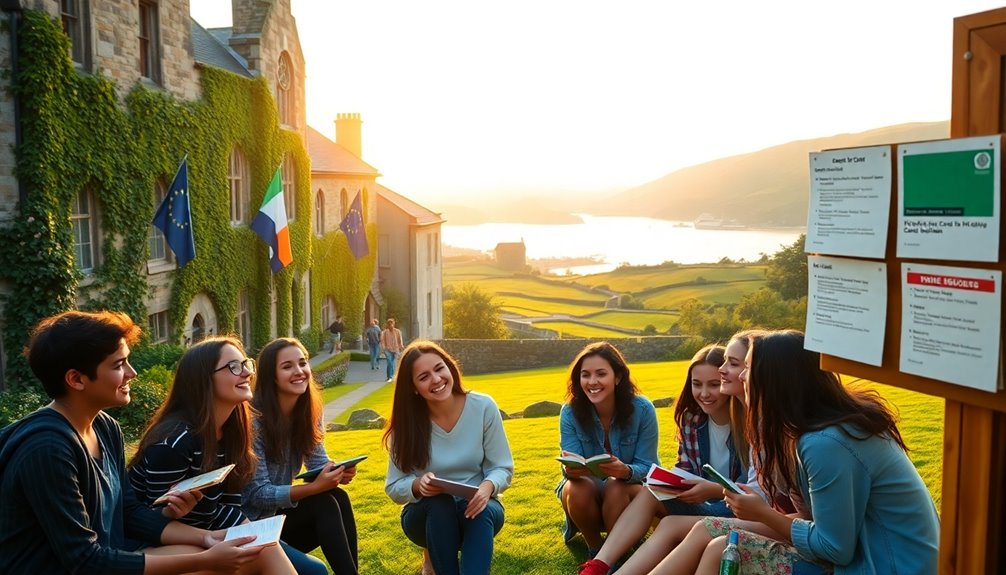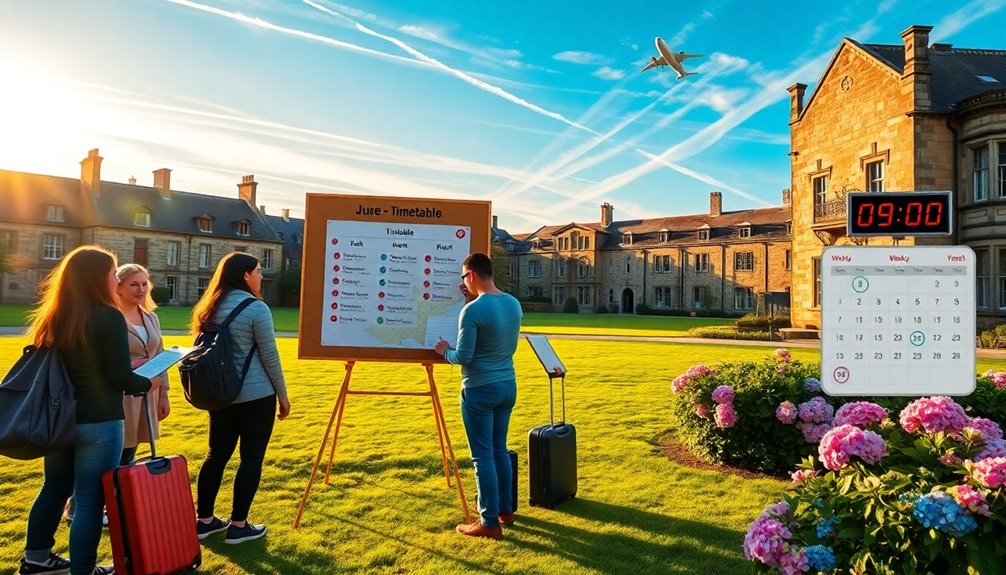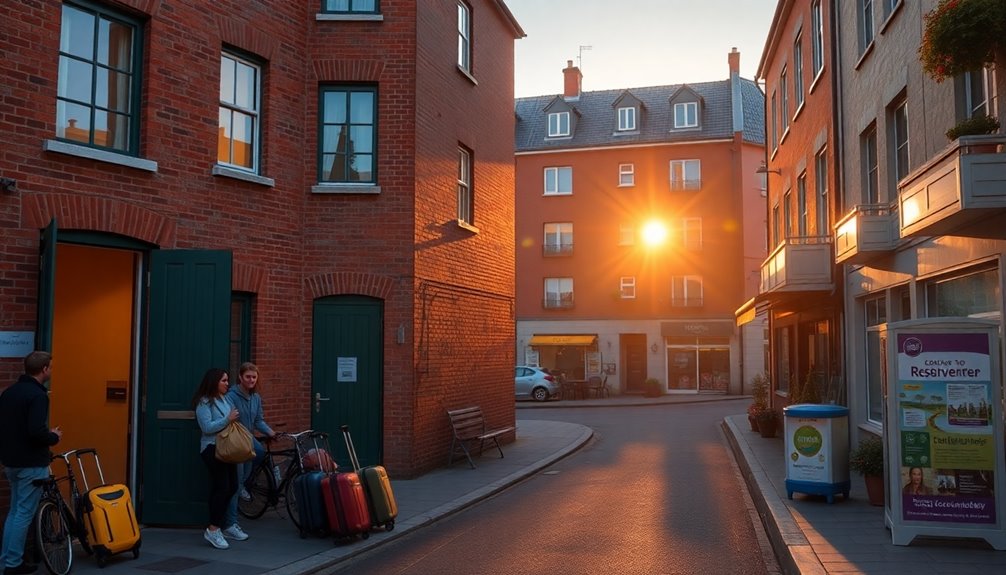
No — you don’t have to be Irish to join summer courses in Ireland. Many programs welcome international students, offering language classes, university credits, and cultural activities designed for diverse groups. You’ll find university-run intensives and private academies, plus homestays or student residences for short stays. Make sure your passport, visa, and budget are in order, and expect plenty of chances to meet locals and peers. Keep going to learn practical tips and program types.
Highlights
- No — many summer courses in Ireland welcome international students alongside locals for language, academic, and cultural programs.
- University-run programs often offer structured, credit-bearing courses with places reserved for overseas participants.
- Private academies and summer schools cater to international learners seeking intensive tutoring or specialized short courses.
- Visa, passport validity, and program eligibility rules vary, so international applicants should confirm requirements before applying.
- Accommodation, transport, and cultural activities are commonly arranged to support visiting students throughout their stay.
Why International Students Choose Summer Courses in Ireland
Why pick Ireland for a summer course? You’ll find a place that lets you expand without constraints: classes that welcome international exposure and informal settings where you can shape learning to your pace. You’ll connect with peers from many countries, trade ideas freely, and build networks that follow you home. Outside the classroom, cultural immersion isn’t staged — it’s everyday life, music in pubs, markets, and conversations that invite curiosity. You won’t be boxed into rigid schedules; opportunities to explore landscapes, local initiatives, and independent projects are everywhere. If you want growth that feels self-directed, Ireland’s mix of open academics and authentic cultural exchange gives you room to choose how deep you go and what you take away.
Types of Summer Programs Available in Irish Cities
You’ll find both university-run language programs and private summer academies across Irish cities, each with different vibes and schedules. If you want structured academic credit and campus life, universities usually offer intensive language courses and cultural activities. For more flexible or specialized options, private academies often provide smaller classes and tailored lesson plans.
University-Run Language Programs
Many Irish universities run summer language programs that blend classroom learning with cultural activities, so you’ll improve your English (or Irish) while exploring cities like Dublin, Galway, and Cork. You’ll join courses geared to different levels, where language immersion is core: classes, conversation labs, and guided city walks push you to use the language daily. These programs often pair you with local students or host families, encouraging genuine cultural exchange and the chance to shape your schedule around study and freedom. Expect workshops, film nights, and short excursions that build skills and confidence without locking you into rigid timetables. If you want structured learning that still leaves room to roam, university-run options give reliable support and authentic local contact.
Private Summer Academies
While university programs focus on immersion and academic support, private summer academies offer a different mix: intensive language tracks, exam prep, arts or sports camps, and bespoke tutoring with more flexible schedules. You’ll find options across Irish cities that let you design your time — full days, half days, or modular weeks — so you don’t feel tied down. These private summer academies emphasize practical, outcome-driven learning experiences, often with small groups or one-to-one coaching, and extracurricular outings that suit your pace. If you want freedom to pick subjects, combine skills, or accelerate progress before term starts, this setup fits. Pricing and quality vary, so check reviews, teacher credentials, and sample timetables before you commit.
Eligibility and Application Requirements for Non-Residents
Before applying, check whether you meet the basic eligibility criteria for non-resident students, including passport validity, appropriate visa type (short-stay for most summer courses or student/long-stay if the program lasts over 90 days), and any academic or language prerequisites the institution sets. You’ll want to confirm application process deadlines, required documents (transcripts, references, proof of funds, health insurance) and any course-specific forms. Many schools let you apply online and upload scans, so you can move fast and keep options open. Pay attention to payment schedules, cancellation policies, and whether acceptance triggers a visa application that needs lead time. Keep copies of everything and stay in contact with the admissions office to protect your travel freedom and avoid last-minute obstacles.
Language and Academic Preparation Offered
Before your course starts, you’ll usually take a language test so instructors can assess your level and place you appropriately. Programs also run short workshops to sharpen academic skills like essay writing, presentation techniques, and research methods. If you need specific support, they’ll often offer tailored placement and one-on-one guidance to match you with the right level and classes.
Pre-Course Language Testing
Wondering how you’ll know if your English is ready for a summer course in Ireland? You’ll usually do a pre course assessment — quick, clear, and designed to measure your language proficiency so you’re placed where you’ll thrive. Tests can be online or in-person, mixing writing, speaking, listening and grammar. Results guide course level, extra support, and freedom to choose electives.
| Test Type | Duration | Outcome |
|---|---|---|
| Online placement | 30–60 min | Level recommendation |
| Speaking interview | 10–20 min | Communication check |
| Listening test | 20–30 min | Comprehension score |
| Writing sample | 20–40 min | Written feedback |
You’ll get honest feedback and options to bridge gaps before classes start.
Academic Skill Workshops
If you want to boost both your English and your study skills, academic skill workshops give targeted, practical training in areas like academic writing, research, presentation skills, and note-taking. You’ll get focused sessions that sharpen academic writing conventions—structuring essays, citing sources, and polishing arguments—so you can write confidently in any setting. Workshops also build communication skills: practicing seminars, delivering concise presentations, and engaging in peer feedback helps you express ideas clearly and persuasively. Because these courses value independence, you’ll be encouraged to choose projects that match your goals and pace. Materials are often adaptable, so whether you aim for study abroad, career moves, or personal growth, the training equips you to navigate academic environments with freedom and competence.
Tailored Placement Support
Building on the skills you sharpen in academic workshops, tailored placement support helps you put those abilities into practice by matching you with language and academic opportunities that fit your goals and level. You’ll get tailored support that respects your need for independence: flexible tutoring, conversation partners, and targeted exam prep. Placement assistance guides you to the right course, internship, or language group so you can explore freely without guesswork. Staff assess your level, discuss your aims, and set a clear, short plan so you move confidently. This service’s focus is practical—fast adjustments, clear milestones, and freedom to change direction as you grow.
| Service | Duration | Outcome |
|---|---|---|
| Tutoring | 4–12 weeks | Fluency boost |
| Placement test | 1 session | Level match |
| Conversation lab | Weekly | Confidence |
| Academic prep | 6 weeks | Skills gain |
| Internship link | Variable | Experience |
Typical Duration and Scheduling of Summer Courses

Most summer courses in Ireland last between one and six weeks, with language programs often running two to four weeks and academic or career-focused short courses clustering around one or two weeks. You’ll find varied course formats — intensive morning lessons, part-time evening options, and blended online-plus-in-person setups — so you can shape study around travel and leisure. Scheduling flexibility is common: several providers offer rolling start dates, modular weeks you can pick, and weekday or weekend timetables to suit your rhythm. If you want freedom, pick programs that let you mix language classes with cultural excursions or professional workshops. Check each provider’s calendar for exact dates and daily timetables so you can plan flights and side trips confidently.
Tuition Fees, Scholarships, and Financial Aid Options
When you’re picking dates and formats for a summer course, the next key question is what it’ll cost and what help’s available to cover those fees. You’ll find courses range from low-cost workshops to full-credit programs; look for tuition assistance from universities, government grants, or program-specific funds. Many schools list scholarship opportunities for international and non-local students — apply early and tailor essays to your goals. Consider short-term work-study, payment plans, or crowdfunding to keep your travel freedom intact. Compare total cost (fees, housing, materials) and deadlines before committing.
| Provider Type | Typical Cost | Aid Available |
|---|---|---|
| University | €300–€3000 | scholarships, tuition assistance |
| Language School | €100–€800 | discounts, payment plans |
| Private Program | €200–€1500 | limited scholarships, bursaries |
Visa Rules and Short-Term Stay Requirements
Although short summer courses often look straightforward, you’ll still need to check Ireland’s entry rules before you book: you might need a visa application, or you may qualify for short term visas depending on your nationality and course length. Know the limits: some stays under 90 days are visa-free, others need approval. Prepare documents early so your freedom to travel isn’t delayed.
- Feel empowered — confirm visa type quickly to keep plans flexible.
- Avoid stress — gather passport, acceptance letter, and proof of funds now.
- Stay spontaneous — apply early and you’ll have time to explore.
If you’re unsure, consult the Irish immigration website or your program provider so you can pursue summer learning without surprises.
Accommodation Choices for Short-Term Students

Because your stay will be short, pick accommodation that balances convenience, cost and safety — student residences and homestays are great for immersion, private rentals give more independence, and hostels or guesthouses work if you want flexibility. You’ll want places that let you explore freely and drop in on classes or activities without hassle. Shared accommodations are practical if you want lower costs and instant social life; just agree ground rules upfront. Staying with a host family can fast-track your language and cultural comfort, though it’s best if you’re okay with some structure. If you crave privacy, look for short-term private lets or studios. Always confirm security, location relative to your course, cancellation policies and included utilities before booking.
Transport and Getting Around Irish Cities
Getting around Irish cities is straightforward once you know the options. You’ll find reliable buses, trams and trains, plenty of bike lanes and walkable areas, and easy access to car rentals or taxis for trips further afield. Think about your daily routes and budget to choose what’ll work best for your summer stay.
Public Transport Networks
When you arrive in Irish cities, you’ll find compact, well-connected public transport systems—buses, trams and local trains—that make getting around straightforward and affordable. You’ll appreciate how public transport boosts transport accessibility, letting you chase classes, cafés and culture without relying on cars. Routes are frequent, fares are reasonable, and cards or apps make payments simple.
- Feel liberated — hop on a tram and be downtown in minutes.
- Stay flexible — frequent buses keep your schedule open.
- Explore confidently — local trains link nearby towns for weekend freedom.
You’ll want a Leap card or relevant app to save money and avoid queues. With clear maps and friendly staff, you’ll move freely through the city and focus on learning and living.
Cycling and Walking
If you prefer a slower, greener way to explore, cycling and walking are ideal for Irish cities — compact layouts, traffic-calmed streets, and extensive bike lanes make short trips quick and pleasant. You can ditch timetables and follow mapped cycling routes linking campuses, cafés, and parks, or rent a bike for a spontaneous spin. On foot, you’ll find urban walking trails that reveal hidden lanes, murals, and riverside views at your own pace. Both modes give you freedom to pause, choose detours, and meet locals. Pack a lightweight lock, wear comfy shoes, and check weather forecasts. Safety’s simple: use lights after dark, signal clearly, and respect pedestrian zones. You’ll move smarter, cheaper, and with more joy.
Car Rentals and Taxis
Although you’ll often find public transport and bikes convenient in Irish cities, renting a car or using taxis gives you flexibility for evenings, day trips, and routes that aren’t well served by buses or trains. You’ll want to weigh car rental options against local taxi services: cars free you to chase coastlines and hidden pubs, taxis save time and hassles after late classes. Consider costs, insurance, parking, and driving on narrow roads. Book in advance during summer festivals, or use apps for on-demand rides. Trust your instinct for freedom — choose the mode that keeps your schedule yours. Feel the spontaneous pull of Ireland, then pick the transport that makes that impulse possible.
- Escape
- Ease
- Adventure
Student Services and Campus Facilities Available
You’ll find a wide range of student services and campus facilities designed to make your summer in Ireland comfortable and productive, from academic support centres and language labs to health clinics, counselling services, libraries, and sports facilities. You’ll get straightforward student support and well-maintained campus amenities that free you to focus on learning and exploring. Staff are accessible, offices are walk-in friendly, and resources are flexible so you can set your own pace. Expect quiet study zones, group workrooms, IT help, and wellness options that respect your autonomy. Below is a quick snapshot of typical offerings to help you plan.
| Service | Availability | Purpose |
|---|---|---|
| Academic help | Daily | Improve skills |
| Health clinic | Weekdays | Medical care |
| Sports centre | Evenings/weekends | Stay fit |
Cultural Activities and Weekend Excursions for Participants

When you’re not in class, a lively program of cultural activities and weekend excursions helps you experience Ireland beyond the lecture hall. You’ll choose open, spirited events that promote cultural immersion—walking tours, traditional music nights, and local markets that let you move freely and connect with locals. Weekend adventures are structured but optional, so you can roam cliffs, castles, or coastal trails at your own pace. You won’t be boxed into rigid schedules; instead, you’ll pick what feeds your curiosity and sense of freedom.
- Stirring live music nights that spark connection and joy.
- Guided hikes to dramatic landscapes for exhilaration and reflection.
- Market and food tours that awaken taste and belonging.
Safety, Health Insurance, and Emergency Contacts
Enjoying Ireland’s music, markets, and trails is best done with peace of mind, so it helps to know how safety, health insurance, and emergency contacts are handled before you go. You’ll want to check what safety measures your program provides — campus security, emergency procedures, and local support networks — and confirm 24/7 contact points for incidents. Make sure your health coverage is valid in Ireland: EU citizens should bring a European Health Insurance Card, while others need travel or student health insurance that covers medical care and repatriation. Save embassy and local emergency numbers, program coordinators, and nearby clinic contacts in your phone and on paper. Staying informed lets you explore freely, knowing help is accessible if you need it.
Tips for Making the Most of a Summer Course in Ireland
1 simple change — planning a few key goals before you arrive — will help you get the most from a summer course in Ireland. Choose courses that match your pace and values during course selection, but leave space to wander. Embrace cultural immersion: chat with locals, try regional food, and attend spontaneous events.
- Set one learning goal that scares you.
- Commit to one local ritual each week.
- Say yes to unexpected invitations.
You’ll gain freedom by balancing structure with curiosity. Use downtime to explore coastlines or cafes, practice the language, and connect with peers. Before you go, map practical needs—transport, budget, study hours—then let exploration lead. You’ll return with skills, stories, and more room to breathe.
Some Questions Answered
Do Summer Courses in Ireland Offer Internship or Job Placement Opportunities?
Yes — many summer courses in Ireland offer internship opportunities and job placements, especially through partnerships and career services; you’ll often find flexible, adventurous options that let you gain real work experience while exploring and enjoying freedom abroad.
Can Family Members Attend or Accompany Participants During Courses?
Absolutely — you can bring loved ones along; family participation and accompanying relatives are often welcome, though policies vary by program and accommodation. You’ll enjoy freedom to explore together, just check specific course guidelines first.
Are Summer Programs Accessible for Students With Mobility Disabilities?
Yes — you’ll find many summer programs accessible for students with mobility disabilities, offering accessibility features and support services so you can move freely, join activities, and get accommodations that respect your independence and travel choices.
Do Universities Provide Credit Transfer Confirmations for Home Institutions?
Yes — universities often issue credit transfer confirmations so you can get credits recognized by your home institution; you’ll want to request official documentation, check equivalency rules, and secure approvals before enrolling to preserve your academic freedom.
Are There Options for Vegetarian, Vegan, or Religious Dietary Accommodations?
Yes — you’ll find dietary preferences respected, with varied meal options for vegetarian, vegan, and religious needs; you’re free to request accommodations, communicate requirements ahead, and expect flexible dining arrangements at most programs and campus facilities.
Summing Everything Up
You’re not limited to locals — summer courses in Ireland welcome you like a character stepping into a modern-day Joyce: curious, wide-eyed, ready to learn. Whether you’re after language skills, academic credits, or cultural immersion, you’ll find programs designed for internationals, with support services, excursions, and safety measures in place. Pack your curiosity and a rain jacket; you’ll leave with new friends, fresh perspectives, and a story that’s distinctly yours to tell.

https://shorturl.fm/j5JP3
https://shorturl.fm/YJEK4
https://shorturl.fm/5VNpS
https://shorturl.fm/OuxYp
https://shorturl.fm/V2JZI
https://shorturl.fm/FmEwl
https://shorturl.fm/L3kvf
https://shorturl.fm/xWa6G
https://shorturl.fm/doYFo
https://shorturl.fm/m7glV
https://shorturl.fm/FrqeJ